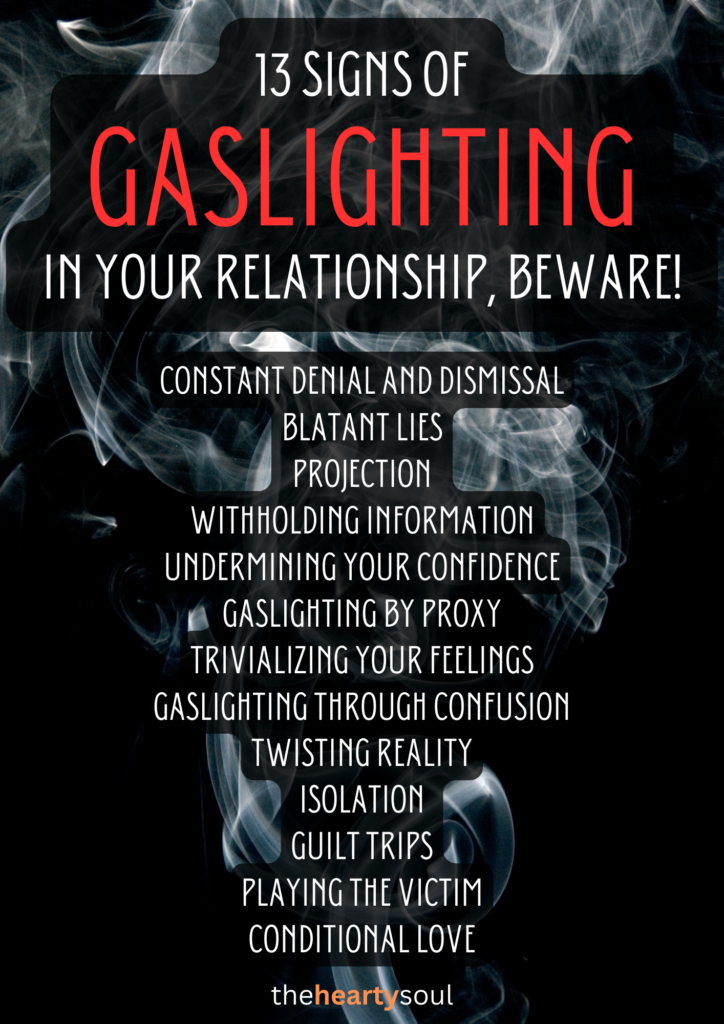Gaslighting is a form of emotional manipulation that can occur in relationships, causing the victim to doubt their own perceptions, memories, and even sanity. Recognizing the signs of gaslighting is crucial for maintaining healthy relationships and protecting oneself from emotional harm. In this article, we’ll delve into 13 key indicators of gaslighting behavior to help you identify and address this hurtful dynamic in your relationship.
Constant Denial and Dismissal

Gaslighters often deny their actions or minimize their impact, making the victim feel like their concerns are unwarranted or foolish. They may brush off your feelings, saying you’re overreacting or imagining things.
Read More: 7 Signs of a Toxic Family
Blatant Lies

Gaslighters are skilled liars who forge stories or distort the truth to manipulate your perception of reality. They may contradict themselves or present false evidence to make you question your own memory and judgment.
Projection

Gaslighters project their own flaws, insecurities, or mischief onto you, making you feel responsible for their behavior or emotions. They may accuse you of being overly sensitive, irrational, or dishonest, deflecting attention away from their own behavior.
Withholding Information

Gaslighters often withhold crucial information or selectively share details to control the narrative and keep you in the dark. They may conceal their actions, intentions, or feelings, leaving you feeling confused and isolated.
Undermining Your Confidence

Gaslighters systematically undermine your self-esteem and confidence, making you doubt your abilities, decisions, and worth. They may criticize your appearance, intelligence, or achievements, eroding your sense of self-worth over time.
Read More: 5 Dead Giveaways There’s a Toxic Person in Your Life
Gaslighting by Proxy

Gaslighters enlist others, such as friends or family members, to prove their false narratives or negate your perceptions. They may manipulate others into doubting your credibility or sanity, further isolating you from sources of support.
Trivializing Your Feelings

Gaslighters belittle your emotions, trivializing your concerns or distress as needless or minor. They may mock your feelings, telling you to “get over it” or “stop being so sensitive,” invalidating your experiences and emotions.
Gaslighting Through Confusion

Gaslighters use confusion as a tactic to control and manipulate you, using contradictory statements, gaslighting techniques, and shifting narratives to keep you off balance. They may exploit your uncertainty to maintain power and control in the relationship.
Twisting Reality

Gaslighters distort reality by selectively presenting information, manipulating events, or reinterpreting past conversations to suit their agenda. They may gaslight you into doubting your memory, perception, or understanding of events, leaving you feeling lost and vulnerable.
Isolation – a huge sign of gaslighting

Gaslighters isolate you from friends, family, or other sources of support, creating a reliance on them for validation and comfort. They may sabotage your relationships or undermine your confidence in others, making you feel isolated and helpless.
Read More: Toxic Marriages Are More Painful For Kids Than Divorce
Guilt Trips

Gaslighters use guilt as a tool for manipulation, making you feel responsible for their behavior or emotions. They may exploit your empathy or sense of duty, guilt-tripping you into compliance or silence to avoid fights.
Playing the Victim

Gaslighters portray themselves as victims of circumstance or persecution, deflecting accountability for their actions and eliciting sympathy or support from others. They may use their perceived victimhood to justify their behavior or evade responsibility.
Conditional Love

Gaslighters offer love, approval, or affection conditionally, using it as a reward for compliance or punishment for defiance. They may deny affection or attention to manipulate your behavior, reinforcing their control over you.
The Bottom Line on Gaslighting

Gaslighting can have profound and lasting effects on your mental health, self-esteem, and relationships. If you recognize any of these signs of gaslighting in your relationship, it’s essential to seek support from trusted friends, family members, or mental health professionals. Remember, you deserve to be treated with respect, honesty, and empathy in your relationships, and gaslighting should never be tolerated. By spotting the signs and setting boundaries, you can reclaim your sense of self and develop healthier, more fulfilling connections.
Read More: Toxic People Never Admit When They Are Wrong
Sources
- “Call me crazy: The subtle power of gaslighting.” Berkeley Science Review. April 16, 2012.
- “The patient’s objects in the analyst’s mind.” Wiley. Nancy Kulish. October 23, 2014.
- “Are you being gaslighted?” Psychology Today. Robin Stern Ph.D. May 19, 2009.
- “What is gaslighting?” The Hotline. May 29, 2014.

